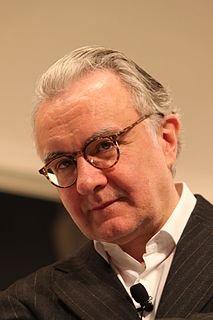A Quote by Peter Ellyard
Globalisation can provide the route for the development of a sustainable and prosperous planetary society in the next generation, provided that globalisation itself becomes more civilised than it is right now.
Related Quotes
Incidentally, I don't think there is a non-adjectival 'globalisation'. What we have now is a particular form: dominated by finance and multinational corporations and by a rhetoric (though not a reality) of 'free trade' and market forces. So I'm not a localist. I'm an internationalist, but one who believes (a) that such a thing is really only possible through a prior grounding and (b) that the terms of our present globalisation have to be challenged politically.
The Congress has provided people with MNREGA, Right to Information, food security, voting right to youths attaining the age of 18 years, land acquisition and rehabilitation act, and development-oriented programs like Jan Lokpal against corruption. That is why only Congress can provide a better government for the country's development.
India is known for much development that has happened since our independence, but at the same time, we have also failed on many levels. It is the responsibility of the future generation to ensure that all these failures are corrected and help create a civilised society with equal opportunities for one and all.


































